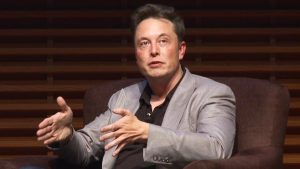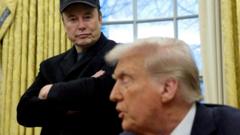The ongoing debate about Wikipedia's editorial practices has intensified following Elon Musk's remarks urging his followers to cease support for the Wikimedia Foundation unless it addresses perceived bias.
Elon Musk Challenges Wikipedia’s Editorial Neutrality in Recent Outburst

Elon Musk Challenges Wikipedia’s Editorial Neutrality in Recent Outburst
Elon Musk calls for a boycott of Wikipedia's donations, accusing the platform of ideological bias and calling it "Wokepedia."
Elon Musk has struck again, this time taking aim at Wikipedia, the ubiquitous online encyclopedia many rely on for knowledge. In a recent post on X, Musk encouraged his followers to cease their donations to the Wikimedia Foundation until they “restore balance to their editing authority,” labeling the platform “Wokepedia” and reigniting discussions about its supposed ideological bias.
The billionaire's criticism followed the sharing of a graph on X that purported to show nearly 29% of Wikipedia's budget being dedicated to “equity” and “safety & inclusion” initiatives. Critics, Musk included, argue that these priorities reflect an underlying agenda that may skew Wikipedia's editorial decisions.
“Stop donating to Wokepedia until they restore balance to their editing authority,” Musk tweeted on December 24, 2024.
This controversy is not unfounded, as various studies have examined the editorial bias on Wikipedia. Research by David Rozado, a computational science professor at Otago Polytechnic, indicated that Wikipedia might be inclined to portray right-leaning figures in a negative light compared to their left-leaning counterparts, as highlighted in a report by Newsweek.
Despite these assertions, Wikipedia co-founder Jimmy Wales has staunchly denied claims of left-wing bias, asserting that the platform remains committed to neutrality. Wales and other advocates argue that studies hinting at a "woke" influence neglect the complexities of Wikipedia’s collaborative editing approach.
Musk's remarks have generated a spectrum of responses on social media; while some have cheered his call for accountability, others express skepticism about his motives, suggesting that his demands for “neutrality” may reflect his own political preferences. Regardless of the differing views, Musk's comments have reignited critical discussions about the difficulties of maintaining neutrality and clarity on influential platforms such as Wikipedia.
As this dialogue unfolds, it sheds light on the pervasive issues of bias in online resources and the vital need for unbiased information amidst an increasingly polarized environment. Given Wikipedia’s prominent status as a knowledge repository, both critics and proponents of the platform will continue to examine its role within the discourse surrounding information integrity.
The billionaire's criticism followed the sharing of a graph on X that purported to show nearly 29% of Wikipedia's budget being dedicated to “equity” and “safety & inclusion” initiatives. Critics, Musk included, argue that these priorities reflect an underlying agenda that may skew Wikipedia's editorial decisions.
“Stop donating to Wokepedia until they restore balance to their editing authority,” Musk tweeted on December 24, 2024.
This controversy is not unfounded, as various studies have examined the editorial bias on Wikipedia. Research by David Rozado, a computational science professor at Otago Polytechnic, indicated that Wikipedia might be inclined to portray right-leaning figures in a negative light compared to their left-leaning counterparts, as highlighted in a report by Newsweek.
Despite these assertions, Wikipedia co-founder Jimmy Wales has staunchly denied claims of left-wing bias, asserting that the platform remains committed to neutrality. Wales and other advocates argue that studies hinting at a "woke" influence neglect the complexities of Wikipedia’s collaborative editing approach.
Musk's remarks have generated a spectrum of responses on social media; while some have cheered his call for accountability, others express skepticism about his motives, suggesting that his demands for “neutrality” may reflect his own political preferences. Regardless of the differing views, Musk's comments have reignited critical discussions about the difficulties of maintaining neutrality and clarity on influential platforms such as Wikipedia.
As this dialogue unfolds, it sheds light on the pervasive issues of bias in online resources and the vital need for unbiased information amidst an increasingly polarized environment. Given Wikipedia’s prominent status as a knowledge repository, both critics and proponents of the platform will continue to examine its role within the discourse surrounding information integrity.



















